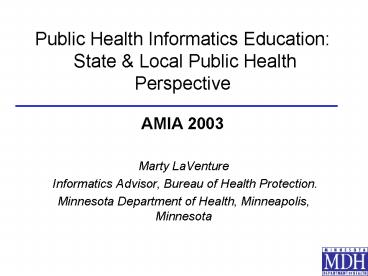Public Health Informatics Education: State - PowerPoint PPT Presentation
1 / 22
Title:
Public Health Informatics Education: State
Description:
Informatics Advisor, Bureau of Health Protection. ... State and Local Public Health Needs & Informatics Implications ... Public Health Informatics Institute ... – PowerPoint PPT presentation
Number of Views:91
Avg rating:3.0/5.0
Title: Public Health Informatics Education: State
1
Public Health Informatics Education State
Local Public Health PerspectiveAMIA 2003
- Marty LaVenture
- Informatics Advisor, Bureau of Health
Protection. - Minnesota Department of Health, Minneapolis,
Minnesota
2
Topics for Discussion
- State and Local Public Health Needs
Informatics Implications - Example Approach to Senior Leadership
Training/Education - Recommendations Future Implications
3
Example Surveillance for Infectious Diseases at
MDH
Reportable Disease Surveillance
Influenza Respiratory Surveillance - SARS -
Public
Unexplained Deaths
Veterinary/Animal Health Vectors West Nile Virus
Source Minnesota Department of Health
4
.Facing a Wide Spectrum (a Storm) of
Information System Needs
- Example Systems
- Online disease surveillance (e.g. NEDSS)
- New born metabolic hearing screening
- Electronic birth death registration
- Environmental health exposures
- Immunization Registries
- Injury surveillance /Trauma
- Encounter, discharge for quality, safety, cost
- Licensing inspection
- Bio-terrorism Surveillance
- Health Alert Network (HAN)
- Example
- Data Vocabulary Standards
- LOINC
- SNOMED
- HL7
- X.12
- ICD-9/-10
- CPT
- ebXML
- LDAP
- CDE
- E-coding
5
Using Informatics to Change Practice
INFORMATICS implies a disciplined approach to
information systems design and implementation
that will drive improvements in public health
practice
Source Adapted from Bellinger, G. Knowledge
Management and the Minnesota Department of Health
6
Approaches to Informatics Training/Education
- Activity
- Executive Leadership Training with the Public
Health Informatics Institute - Core Competencies Individual Organizational
- Approach
- Modular, Iterative Strategic
- Practical Adult learning focused
- Limited Academic focus
7
Example Public Health Informatics Institute -
Leadership Workshop
Workshop Agenda
- Introduction
- Informatics Context
- Key Best Practices
- Just Do It
- Wrap-Up EvaluationAll
8
Key Concepts
Introduction
- Informatics principles
- Information system (IS) project success factors
- Change management
- Workforce development
- Evolving governance structures, roles,
relationships - Strategic alignment Agency goals program
objectives informatics strategy practice
results - Approaches to strengthen the chain of
accountability for informatics in practice - Comprehensive evaluation
9
Key Best Practices Overview
Implement Key Informatics Practices
- Manage change pro-actively
- Develop informatics competencies
10
Informatics Competencies
Organizational Development
Principles in Practice Managing Change
Informatics Competencies for Public Health
Professionals describes
- Three classes of informatics competencies
- The use of information
- The use of information technology
- The development, deployment, and maintenance of
information systems - Required levels of proficiency vary by job
- Front-line staff, senior-level technical staff,
supervisory and management staff
11
Organizational Capacity
Organizational Development
Principles in Practice Managing Change
- The sum of individual competencies does not
necessarily equal organizational capacity - Changes may be needed in your organization to
ensure that information is managed strategically
and information systems development is done
coherently and professionally
Moving towards an informatics savvy organization
12
Accountability Checklist forIS Project Life Cycle
Key Best Practices Accountability Evaluation
Conceptualize Plan
Conceptualize Plan Define Requirements Design
Implement Test Train Go Live Use, Evaluate
Plan
- Executive roleTo do, or not to do
- Business case
- Strategic fit
- Stakeholders
- Funding / Resources
13
Practice Makes Better
- This is a facilitated group session intended to
help participants apply workshop concepts - Please see session material under the tab marked
Just Do It
14
Materials
Introduction
- Toolkit
- Resources
- Glossary
- Annotated bibliography
- Slide presentation
15
ResultsParticipant Evaluation
16
Example Comments
- this is the best workshop I have attended in
years and I have been to a lot
(county health official) - Very practical, I will use this tomorrow
- (health department director)
- I dont get it all yet, but this will be very
helpful as I work with my county IT staff - (local director)
17
Lessons Learned So FarPublic Health Executives
Need . . .
- Validation that they have an important role
that role is leadership, management and decision
making not IT. - Reminding that Public Health drives IT and not
vice versa - To understand they dont have to be technical
expert to make decisions - To learn about key Informatics Best Practices
their role in adapting and implementing them
18
Recommendations
- Granting Agencies (e.g., CDC, RWJF, NIH)
- Make the core competencies part of grant
expectations - Allow/Promote spending on informatics training
(include executives) - Support community driven pilot training efforts
- Contribute to developing a common curriculum,
based in practice - Test a multi-step model for follow-up
19
Recommendations (continued)
- Public Health Agencies
- Implement executive leadership training consider
training in collaborative settings (state
local, executives and managers, admin IT, etc.)
- Adopt informatics competencies and establish a
plan for implementation - Select adapt informatics Best Practices to your
organizational context - Educators / Academic Settings
- Develop informatics training programs for public
health professionals - Assure training is grounded in practice-based
principles
20
Implications for the Future
- Challenges
- We are just getting started a lot is new ground
- Need to leverage funding resources
- Create expanded models for delivery
- Develop curriculum framework for multiple
audiences especially the workforce - Determine the effect of certification
21
Acknowledgements
- Public Health Informatics Institute
- Dave Ross Director
- Kris Saarlas Deputy director
- Laura Ripp Project manager, informatics
leadership workshop - Rhoda Nicholas, Utah Dept. of Health
- Aggie Leitheiser, Minnesota Dept. of Health
22
Questions?Marty LaVentureMinnesota Department
of Healthwww.health.state.mn.usmartin.laventure_at_
health.state.mn.us612-590-0898
Thank You































